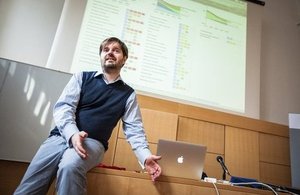British best practice supports energy literacy debate in Slovenia
James Geddes, Policy Advisor at the Department of Energy and Climate Change, presented the UK's 2050 Pathways Calculator at the EN-LITE Energy Literacy Week in Maribor.

James Geddes at EN-LITE week
On the last day of a week-long conference on energy literacy James Geddes explained how the 2050 Pathways Calculator allows individuals to make different choices about their energy future and see the implications based on the real scientific data. It helps everyone engage in the energy debate and lets governments make sure their planning is consistent with their long-term aim.
James Geddes said:
‘If we want to have a proper energy literacy debate, it is not enough to add just numbers, but we need to quantify what we are talking about, whether it is energy or cost. Also, it is very important that we put the numbers into context so we can compare the arguments.’
‘The Department of Energy and Climate Change is working with countries around the world to help them develop their own calculators, and is also building a Global Calculator to look at ways to reduce emissions worldwide. The Calculator is an open source and can be used by other countries.’
The presentation was followed by a discussion and a meeting with Slovene offcials exploring the role of research in meeting our energy challenges and ways in how Slovenia and the UK could work together towards a more sustainable energy future.
The conference was a part of an international project supported by the British Embassy Ljubljana to promote energy literacy EN-LITE in Slovenia and in the wider region. It aims to encourage stakeholders so that they understand basic energy concepts, the impact of energy production and can develop and insight into science-based way science supported way of discussing energy issues.
Further information
Read more about 2050 Pathways Calculator.
Find out more about the EN-LITE project